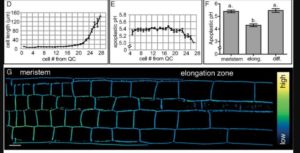Auxin steers root cell expansion via apoplastic pH regulation in Arabidopsis thaliana
 Barbez et al. introduce a fluorescent dye (8-hydroxypyrene-1,3,6-trisulfonic acid trisodium salt, HPTS) to track apoplastic pH in Arabidopsis roots and uncover some nuances in the auxin acid growth hypothesis. A sudden spike in auxin, perhaps counter-intuitively, causes a transient alkalization of the apoplast, preventing cell expansion. The mechanism may depend on the concentration of auxin, as has been observed before with lower concentrations of auxin stimulating growth and high concentrations inhibiting it. They also note that there is a biphasic role for auxin, where the initial alkalization abates and apoplastic pH becomes acidic in the presence of auxin, promoting cell expansion. HTPS has cellular resolution and pH in the meristem was observed to be high before becoming acidic in the elongation zone and rising again in the differentiation zone. PNAS 10.1073/pnas.1613499114 (OA)
Barbez et al. introduce a fluorescent dye (8-hydroxypyrene-1,3,6-trisulfonic acid trisodium salt, HPTS) to track apoplastic pH in Arabidopsis roots and uncover some nuances in the auxin acid growth hypothesis. A sudden spike in auxin, perhaps counter-intuitively, causes a transient alkalization of the apoplast, preventing cell expansion. The mechanism may depend on the concentration of auxin, as has been observed before with lower concentrations of auxin stimulating growth and high concentrations inhibiting it. They also note that there is a biphasic role for auxin, where the initial alkalization abates and apoplastic pH becomes acidic in the presence of auxin, promoting cell expansion. HTPS has cellular resolution and pH in the meristem was observed to be high before becoming acidic in the elongation zone and rising again in the differentiation zone. PNAS 10.1073/pnas.1613499114 (OA)




Leave a Reply
Want to join the discussion?Feel free to contribute!